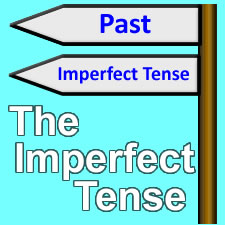German Imperfect Tense
Here we want to go through how you talk about the past in German. There are a few forms of the past tense in German.
We were talking about the perfect tense in our last blog and in this article we will be looking at the imperfect tense.
Learn and enjoy the German language with Jabbalab!
When to use the imperfect tense
- To talk about situations in the past such which have no link to the present anymore:
For example:
She bought a red bag which she gave her friend. ⇨ Sie kaufte eine rote Tasche, die sie ihrer Freundin schenkte.
- A situation which describes how people felt in the past or how things were in the past:
For example:
I was glad when he came home. ⇨ Ich war froh, als er nach Hause kam.
- It’s also used when something used to happen regularly
For example:
I played the piano every day. ⇨ Ich spielte jeden Tag Klavier.
Forming a past tense sentence in the imperfect tense
Forming a sentence with the imperfect tense depends on whether the verb is a weak verb, a strong verb, or a mixed verb.
Forming the imperfect tense with weak and mixed verbs
To form the imperfect tense of a weak verb, you need to change the ending and leave the stem as it is, the same way as you do in the present tense. With mixed verbs the ending is the same as the weak verbs, however the stem will also change as it does in the present tense.
| Pronoun | Ending | Example |
|---|---|---|
| ich | -te | ich machte |
| du | -test | du machtest |
| er / sie / es | -te | er / sie / es machte |
| wir | -ten | wir machten |
| ihr | -tet | ihr machtet |
| sie / Sie | -ten | sie / Sie machten |
Here are a few examples of how to get a weak verb into the past tense:
spielen – to play – ich spielte
machen – to make, to do – ich machte
Here are a few examples of how to get a mixed verb into the past tense:
kennen – to know – ich kannte
rennen – to run – ich rannte
Some weak verbs will change their spelling when used in the imperfect tense. This depends on which letter the stem of the weak verb ends with.
If it ends with d, t, m or n you need to put an extra e before the usual imperfect ending.
For example:
ich arbeitete – I worked
ich redete – I talked
Forming the imperfect tense with strong verbs:
The main difference between weak and strong verbs in the imperfect tense is that strong verbs have different endings.
As with mixed verbs, the stem may change when going into the past tense.
| Pronoun | Ending | Example |
|---|---|---|
| ich | – | ich trank |
| du | -st | du trankst |
| er / sie / es | – | er / sie / es trank |
| wir | -en | wir tranken |
| ihr | -t | ihr trankt |
| sie / Sie | -en | sie / Sie tranken |
Examples:
essen – to eat – ich aß
fahren – to drive – ich fuhr
trinken – to trink – ich trank

